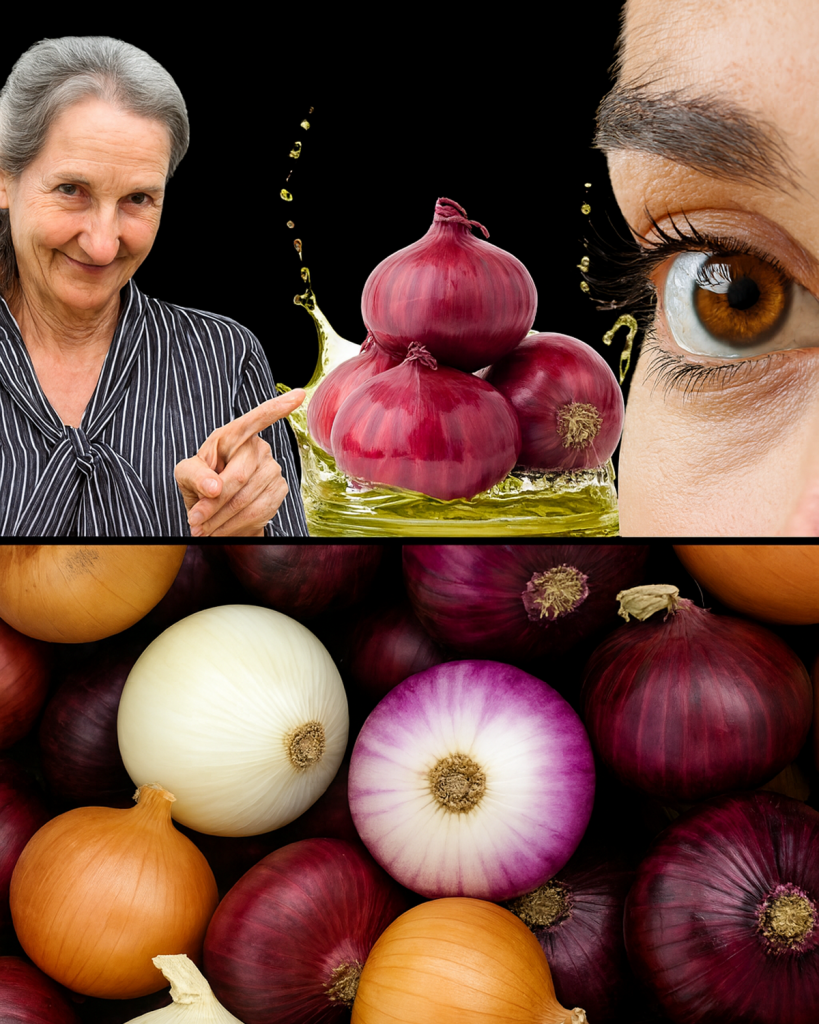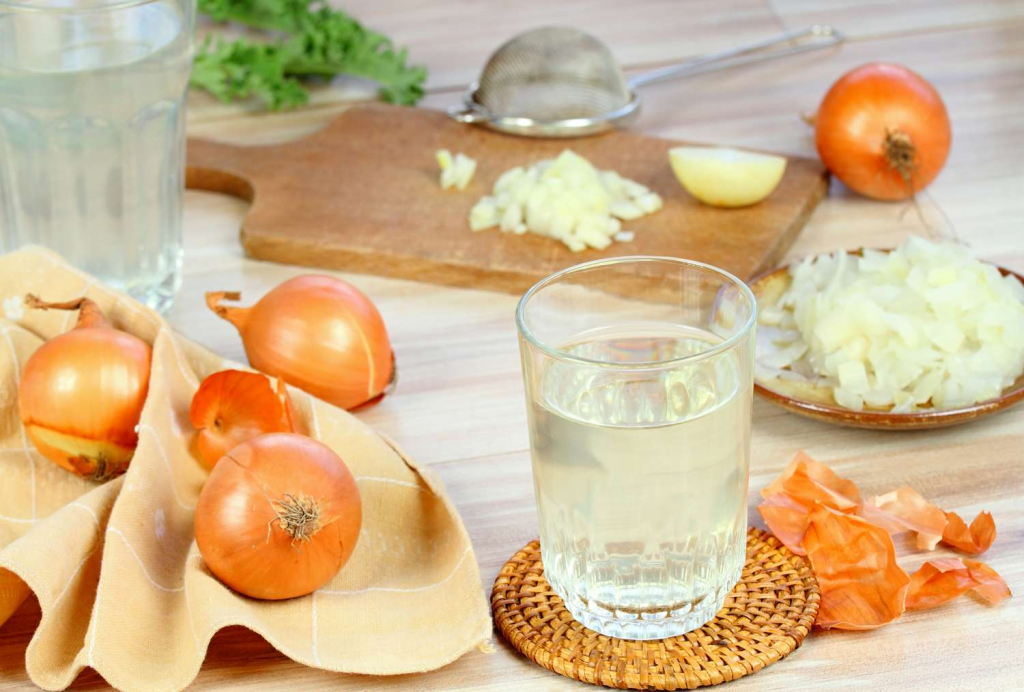Did you know that over 2.2 billion people worldwide suffer from vision impairment according to the World Health Organization? Eye problems such as blurry vision, eye strain, and difficulty focusing have become increasingly common due to modern lifestyles dominated by screens. From teenagers glued to smartphones to adults working long hours on computers, our eyes are under more stress than ever before.
On our fanpage, readers often ask: “Are there natural ways to support my eyesight at home?” That curiosity inspired this article. Here, we’ll explore an age-old remedy that has sparked intrigue for centuries—using onions to support vision health. Some claim that simple kitchen ingredients, like onions, may provide supportive benefits for eye wellness if used consistently.
In this article, you’ll discover how onions are traditionally believed to help, practical methods for including them in your daily life, other lifestyle strategies for protecting your vision, and what science has to say about natural eye care. By the end, you’ll not only understand the claims but also have a set of holistic strategies to care for your eyesight naturally.

Why Natural Vision Care Matters
The Growing Challenge of Poor Eyesight
From nearsightedness (myopia) to age-related macular degeneration, eye problems affect millions globally. Digital eye strain is now one of the top complaints at eye clinics. With so much reliance on glasses, contact lenses, and surgery, the idea of natural approaches feels refreshing—and worth exploring.
The Traditional Belief in Onion for Eyes
In many folk traditions across Asia and the Middle East, onions have been considered a supportive remedy for eye health. Families would pass down recipes involving onion juice or onion-infused tonics believed to enhance eyesight when used consistently. While modern medicine doesn’t endorse onions as a cure, their nutritional profile makes them interesting.
What’s Inside an Onion?

Onions are rich in:
- Vitamin C – supports collagen production, important for eye tissues
- Antioxidants (like quercetin) – may help reduce oxidative stress linked to vision decline
- Sulfur compounds – contribute to overall wellness and support healthy blood circulation
These nutrients are known to support general health, and that’s why some believe onions may also play a role in protecting eyes naturally.
How Onions Are Traditionally Used for Eye Health
Consuming Onions in Your Diet
Eating onions regularly—whether raw, cooked, or as part of salads and soups—provides a steady dose of antioxidants and vitamins that contribute to wellness. Some people swear by having a small portion of raw onion daily.
Practical tip: Add finely chopped onions to your salad, stir-fry, or omelets. Start small to let your body adjust, as raw onions can be pungent.
Onion Juice Remedies in Folklore
Traditional practices suggest mixing onion juice with honey or applying it cautiously around the eyes. These methods are not supported by modern ophthalmology due to risk of irritation, but they remain a part of cultural wellness routines.
Important note: Never apply raw onion juice directly to your eyes without medical supervision. It can cause stinging or even harm. Instead, focus on incorporating onions into meals.
Onion-Infused Drinks
Some wellness enthusiasts prepare onion tea or infusions. While not common in modern diets, these drinks were once believed to purify the body and indirectly benefit the eyes.

Simple recipe: Boil chopped onions with water, add a touch of ginger and honey, and drink it warm.
Other Natural Ways to Improve Eyesight at Home
Onions are just one piece of the puzzle. Eye health is best supported through a combination of lifestyle habits.
Eye-Friendly Foods to Add to Your Diet
| Food | Key Nutrients | Potential Benefits |
|---|---|---|
| Carrots | Beta-carotene (Vitamin A) | Supports retinal health |
| Spinach & Kale | Lutein, Zeaxanthin | Filters harmful blue light |
| Fish (Salmon, Sardines) | Omega-3 fatty acids | Supports tear production & retina |
| Eggs | Zinc, Lutein | Protects against macular degeneration |
| Blueberries | Antioxidants | May reduce oxidative stress |
Daily Habits That Protect Your Vision

- Follow the 20-20-20 Rule: Every 20 minutes of screen time, look 20 feet away for 20 seconds
- Stay Hydrated: Dry eyes are often linked to dehydration
- Get Quality Sleep: Eyes recover best during deep sleep
- Practice Eye Exercises: Gently roll your eyes in circles or focus on distant objects
- Wear Sunglasses Outdoors: Protects against UV rays
What Science Says About Onions and Vision
Modern research hasn’t confirmed onions as a direct treatment for vision improvement. However, scientific studies highlight several related points:
- Antioxidants and eye health: Free radicals are linked to cataracts and retinal damage. Antioxidants, abundant in onions, play a role in neutralizing these effects
- Blood circulation: Healthy circulation is vital for oxygen delivery to eye tissues. Onion compounds may support better blood flow
- Anti-inflammatory properties: Chronic inflammation contributes to many eye disorders, and onions contain compounds known for their anti-inflammatory effects
While promising, these findings should be seen as supportive, not definitive. Onions should be considered part of a balanced diet, not a replacement for professional care.
A 5-Day Plan to Start Supporting Your Eyes Naturally
Want to test how natural methods make you feel? Here’s a gentle 5-day routine you can try:
Day 1: Add half a raw onion to your lunch salad. Practice the 20-20-20 rule
Day 2: Drink onion-ginger infusion in the evening. Limit screen time before bed
Day 3: Cook a hearty vegetable soup with onions, carrots, and spinach. Do 5 minutes of eye exercises
Day 4: Enjoy grilled salmon with onions on the side. Wear sunglasses outdoors
Day 5: Repeat your favorite onion-based recipe and reflect on how your eyes feel
This plan is not a medical cure but a simple way to experiment with healthier eating and mindful habits.

Common Myths About Onions and Vision
“Onions can cure blindness.”
False. No food can cure blindness. Onions may support overall eye wellness but cannot reverse serious eye disease
“Applying onion juice directly to the eyes is safe.”
Not recommended. It can cause pain, irritation, and even damage. Always prioritize safety
“You’ll see results in exactly 5 days.”
Everyone’s body is different. While some feel more energized or notice less eye strain, true results depend on consistent lifestyle habits
Conclusion
Caring for your eyes naturally is about balance. Onions, with their antioxidants and traditional reputation, can be a valuable part of your diet. Combined with nutrient-rich foods, regular eye exercises, protective habits, and professional care when needed, they can help you support your vision the natural way.
If you’ve ever wondered whether your kitchen could hold secrets to better eyesight, onions are an interesting place to start. Explore, experiment, and listen to your body.
FAQ
Q1: Can onions really improve eyesight in 5 days?
There is no scientific proof that onions directly improve eyesight in 5 days. They may support overall eye wellness as part of a healthy diet
Q2: Is it safe to put onion juice in the eyes?
No. Applying raw onion juice directly to the eyes can be harmful. It’s best to consume onions as food
Q3: Which foods are best for eye health besides onions?
Carrots, spinach, kale, fish rich in omega-3, eggs, and blueberries are all excellent for supporting vision
Q4: How often should I eat onions for eye benefits?
Including onions a few times a week in balanced meals is a safe and practical approach
Q5: Should I still see an eye doctor if I use natural remedies?
Yes. Natural methods can support wellness, but professional eye care is essential for diagnosing and treating serious issues
*Disclaimer: This article is for informational purposes only. It is not a substitute for professional medical advice, diagnosis, or treatment. Always consult with a qualified healthcare provider for concerns about your eyesight or health.




